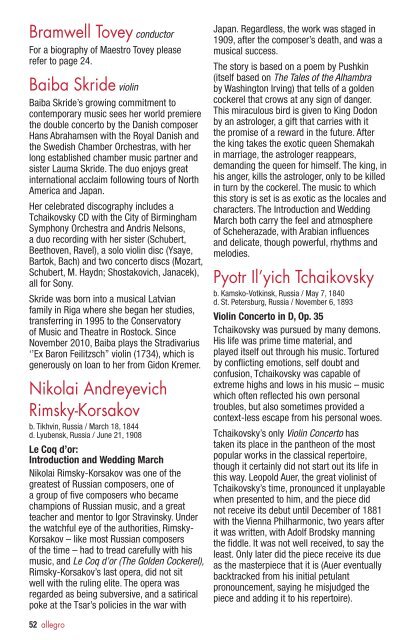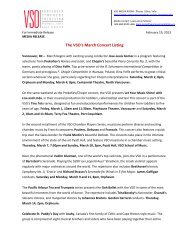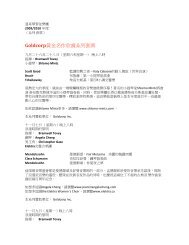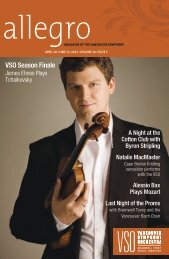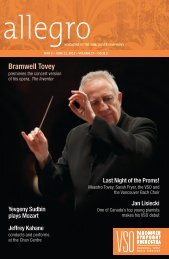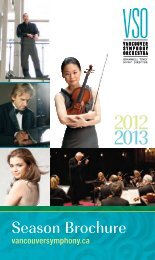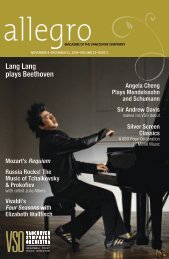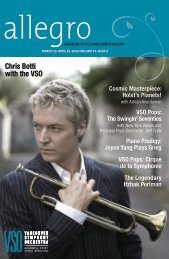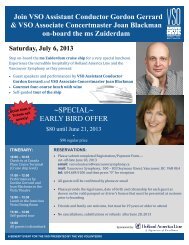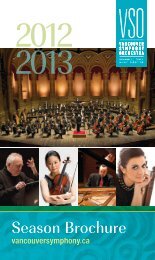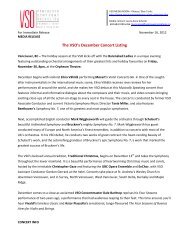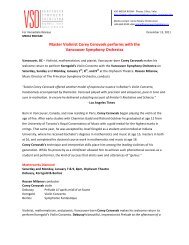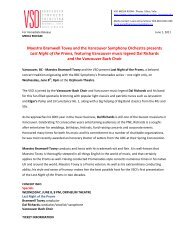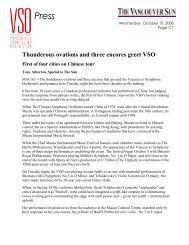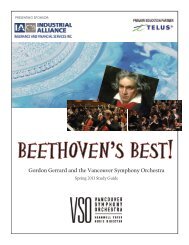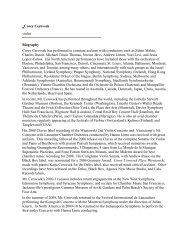issue five - Vancouver Symphony Orchestra
issue five - Vancouver Symphony Orchestra
issue five - Vancouver Symphony Orchestra
You also want an ePaper? Increase the reach of your titles
YUMPU automatically turns print PDFs into web optimized ePapers that Google loves.
Bramwell Tovey conductor<br />
For a biography of Maestro Tovey please<br />
refer to page 24.<br />
Baiba Skride violin<br />
Baiba Skride’s growing commitment to<br />
contemporary music sees her world premiere<br />
the double concerto by the Danish composer<br />
Hans Abrahamsen with the Royal Danish and<br />
the Swedish Chamber <strong>Orchestra</strong>s, with her<br />
long established chamber music partner and<br />
sister Lauma Skride. The duo enjoys great<br />
international acclaim following tours of North<br />
America and Japan.<br />
Her celebrated discography includes a<br />
Tchaikovsky CD with the City of Birmingham<br />
<strong>Symphony</strong> <strong>Orchestra</strong> and Andris Nelsons,<br />
a duo recording with her sister (Schubert,<br />
Beethoven, Ravel), a solo violin disc (Ysaye,<br />
Bartok, Bach) and two concerto discs (Mozart,<br />
Schubert, M. Haydn; Shostakovich, Janacek),<br />
all for Sony.<br />
Skride was born into a musical Latvian<br />
family in Riga where she began her studies,<br />
transferring in 1995 to the Conservatory<br />
of Music and Theatre in Rostock. Since<br />
November 2010, Baiba plays the Stradivarius<br />
‘’Ex Baron Feilitzsch’’ violin (1734), which is<br />
generously on loan to her from Gidon Kremer.<br />
Nikolai Andreyevich<br />
Rimsky-Korsakov<br />
b. Tikhvin, Russia / March 18, 1844<br />
d. Lyubensk, Russia / June 21, 1908<br />
Le Coq d’or:<br />
Introduction and Wedding March<br />
Nikolai Rimsky-Korsakov was one of the<br />
greatest of Russian composers, one of<br />
a group of <strong>five</strong> composers who became<br />
champions of Russian music, and a great<br />
teacher and mentor to Igor Stravinsky. Under<br />
the watchful eye of the authorities, Rimsky-<br />
Korsakov – like most Russian composers<br />
of the time – had to tread carefully with his<br />
music, and Le Coq d’or (The Golden Cockerel),<br />
Rimsky-Korsakov’s last opera, did not sit<br />
well with the ruling elite. The opera was<br />
regarded as being subversive, and a satirical<br />
poke at the Tsar’s policies in the war with<br />
Japan. Regardless, the work was staged in<br />
1909, after the composer’s death, and was a<br />
musical success.<br />
The story is based on a poem by Pushkin<br />
(itself based on The Tales of the Alhambra<br />
by Washington Irving) that tells of a golden<br />
cockerel that crows at any sign of danger.<br />
This miraculous bird is given to King Dodon<br />
by an astrologer, a gift that carries with it<br />
the promise of a reward in the future. After<br />
the king takes the exotic queen Shemakah<br />
in marriage, the astrologer reappears,<br />
demanding the queen for himself. The king, in<br />
his anger, kills the astrologer, only to be killed<br />
in turn by the cockerel. The music to which<br />
this story is set is as exotic as the locales and<br />
characters. The Introduction and Wedding<br />
March both carry the feel and atmosphere<br />
of Scheherazade, with Arabian influences<br />
and delicate, though powerful, rhythms and<br />
melodies.<br />
Pyotr Il’yich Tchaikovsky<br />
b. Kamsko-Votkinsk, Russia / May 7, 1840<br />
d. St. Petersburg, Russia / November 6, 1893<br />
Violin Concerto in D, Op. 35<br />
Tchaikovsky was pursued by many demons.<br />
His life was prime time material, and<br />
played itself out through his music. Tortured<br />
by conflicting emotions, self doubt and<br />
confusion, Tchaikovsky was capable of<br />
extreme highs and lows in his music – music<br />
which often reflected his own personal<br />
troubles, but also sometimes provided a<br />
context-less escape from his personal woes.<br />
Tchaikovsky’s only Violin Concerto has<br />
taken its place in the pantheon of the most<br />
popular works in the classical repertoire,<br />
though it certainly did not start out its life in<br />
this way. Leopold Auer, the great violinist of<br />
Tchaikovsky’s time, pronounced it unplayable<br />
when presented to him, and the piece did<br />
not receive its debut until December of 1881<br />
with the Vienna Philharmonic, two years after<br />
it was written, with Adolf Brodsky manning<br />
the fiddle. It was not well received, to say the<br />
least. Only later did the piece receive its due<br />
as the masterpiece that it is (Auer eventually<br />
backtracked from his initial petulant<br />
pronouncement, saying he misjudged the<br />
piece and adding it to his repertoire).<br />
52 allegro


